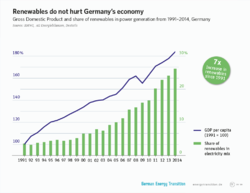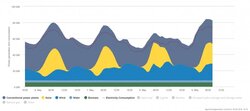It was only briefly on last Sunday, but still quite remarkable. 55 GW power from renewables is impressive.
http://thinkprogress.org/climate/2016/05/09/3776629/germany-renewable-generation/
Also notable is how good this is turning out for their economy.

http://energytransition.de/2012/10/1-iii-stimulating-technology-innovation-and-the-green-economy/
http://thinkprogress.org/climate/2016/05/09/3776629/germany-renewable-generation/
Also notable is how good this is turning out for their economy.

http://energytransition.de/2012/10/1-iii-stimulating-technology-innovation-and-the-green-economy/


